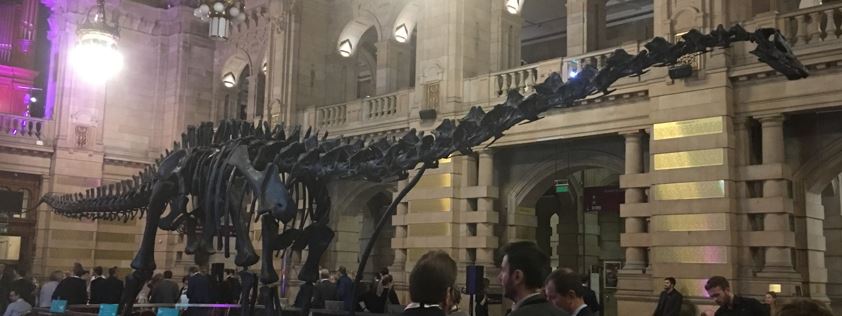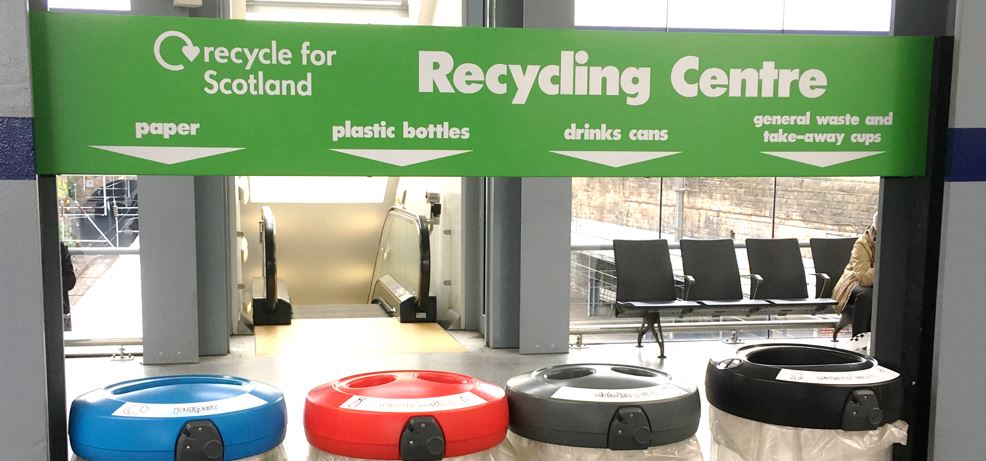Deeply Dippy
This week, with a certain amount of meteorological inversion, I escaped the snow in England to spend a couple of days in a sunny Glasgow to attend the Industrial Biotechnology Innovation Centre’s 5th annual conference, themed around “Industrial Biotechnology for a Sustainable Future”. In my role as a member of the Centre’s Commercial Advisory Board, I played a part on the committee that helped the IBioIC team put together the event which has proved to be a great success. Not wishing to undermine the science in any way, one of the highlights of the programme was the conference dinner held at the Kelvingrove Art Gallery in the company of the Natural History Museum’s famous diplodocus skeleton ‘Dippy’ which is undertaking a roadshow now that its place in Kensington has been taken by a blue whale. Whales, of course, need all the help they can get, especially in light of the recent deplorable decision that Japan is to resume commercial whaling later this year, but there is something rather more spectacular about dinosaurs.

Back to the science, though, and what is being done in the world of industrial biotechnology in Scotland and beyond. In recent polling, 7 out of 8 people in the UK turned out not to know what the ‘bio-economy’ is. Of the 1 in 8 that did, 94% thought of it positively – good news for IBioIC and all of the assembled delegates. Even better news is that when the concept was explained to the 7/8ths who weren’t familiar with it, the overwhelming majority of them were also positive about it. Although much recent attention has been focused on ocean plastics, coffee cups and ‘wonky veg’, waste in and around the agri-food system more generally clearly strikes a chord with many people and there is an understandable desire among citizens to make the best use of the resources we have. There are some specifics relating to Scotland’s geography, current products and legacy economy that were the focus of some of the sessions. One of the more interesting discussed how exhausted natural gas fields off Scotland’s east coast are to be used for depositing carbon, in the form of industrially-produce carbon dioxide back underground using existing infrastructure.
At a cost of around £100/ton, Carbon Capture and Storage (CCS) is not a silver bullet, but as an adjunct to the fossil fuel dependency which has driven the global economy for the past century or so, it is at the very least a valuable intermediate step whilst we continue to replace hydrocarbons with cleaner forms of energy. It is not without irony, therefore, that the day before the conference started a natural gas discovery in the central North Sea, described as the biggest find in more than a decade and equivalent to 250 million barrels of oil, was announced by the state-owned Chinese company CNOOC. Natural gas is less bad than coal, which still powers much of China and elsewhere, but it is still bad in a world where we’re already struggling to find ways to keep global temperature rises below 2o over pre-industrial temperatures, let alone the 1.5o target generally agreed to be the threshold beyond which catastrophic climate impacts are expected. The announcement came in the same week as there was also widespread coverage in the mainstream media of a study published in Nature Climate Change predicting significant loss of lake ice across the northern hemisphere within a generation, with dire economic as well as environmental consequences.

It is more than timely, then, that there were projects showcased at the conference working on displacing fossil fuels from the future economy, not just mitigating their impact. One of these is even looking to replace existing aviation fuel with a bio-based alternative. Electrical power from renewable sources is already doing a good job of displacing fossil fuels, and Scotland is at the forefront of wind energy and other renewable technologies. It is only a few months since the announcement that Loganair could introduce the world’s first electric passenger plane service on routes in the Orkney islands by 2021, but it will be a while yet before anything other than liquid fuel powers long-haul flights. Coincidentally, this is the same sort of timescale for the CCS project mentioned above. Back in the world of food and drink, which is a very important part of the Scottish economy, Zero Waste Scotland is actively working with businesses to improve their resource efficiency, and the commitment to recycling in public spaces is exemplary. Despite a recent poll commissioned by the Metal Packaging Manufacturers Association finding that 52% of consumers did not always choose the most sustainable option due to “inconvenience”, it all goes to show that more resource-conscious living is a practical possibility with very little effort.